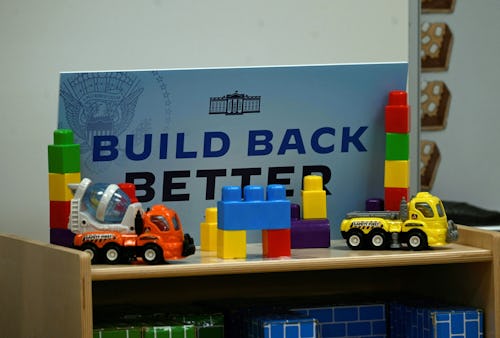Biden finally unveiled his "Build Back Mediocre" agenda
Congratulations to Joe Manchin, Kyrsten Sinema, and nobody else.

After months of haggling, start-stop negotiations, and absolutely asinine posturing, President Biden unveiled on Thursday a dramatically scaled-back version of his ambitious domestic policy slate. He also pointedly insisted Sens. Joe Manchin (W.Va.) and Kyrsten Sinema (Ariz.), the ostensibly Democratic holdouts who have repeatedly stymied his “Build Back Better” agenda, could and should vote for this new version of the bill in the Senate.
In a statement trumpeting the pared-down version of the president’s signature domestic promise, the White House made special effort to mention Manchin and Sinema by name as having participated in “good faith” negotiations with the administration, claiming “President Biden is confident this is a framework that can pass both houses of Congress.”
While the broad outline of the $1.75 trillion plan the administration does contain some sincerely ambitious goals — including free universal preschool, expanded Pell grants, lower premiums for those enrolled in the Affordable Care Act, and a sizable commitment to adapting to catastrophic climate change — it is largely a pale shadow of Biden’s initial “Build Back Better” pitch, which began as a more than $3 trillion proposal before being significantly winnowed down by Manchin and Sinema’s obstinate, and frequently perplexing, objections.
Plans for paid family and medical leave, one of Biden’s key campaign promises, are nowhere to be found in the final framework, after Manchin’s staunch refusal to support the bill if they were included. It also no longer contains plans for free community college or expanded Medicaid vision and dental coverage — one of the key goals for Sen. Bernie Sanders. The framework also dropped prescription drug price reform, despite the White House having reportedly struck a deal with Sinema on the topic, amid apparent opposition from progressive Democrats who argued the agreement was wildly insufficient. And while the Biden administration insisted Thursday that the framework will “ask the highest income Americans to pay their fair share,” it has seemingly dropped plans for a “billionaire tax” deeply opposed by Manchin (who represents zero actual billionaires) in exchange for a dramatically scaled back “surtax” that would apply a “5% rate above income of $10 million, and an additional 3% surtax on income above $25 million.”
Despite the White House’s confidence that the framework — which will inform the actual legislative language of the eventual bills — has enough support from Senate Democrats to pass the upper chamber, it now faces a potential threat from the party’s progressive wing in the House, where dozens of members are reportedly dragging their heels to support anything less than a fully authored bill.
At issue in part is whether or not they fully trust Manchin and Sinema to actually vote for the framework, House Progressive Caucus members told Politico. Speaking with the press on Thursday morning, HPC leader Pramila Jayapal called it a “leap of faith” to trust the Biden administration’s assertion that the framework has the votes to pass.
Nevertheless, it seems as if some House progressives are also softening their bargaining position, reportedly offering to pass the White House’s infrastructure bill — which they’ve thus far held in hock — on the mere promise that the Build Back Better bill will pass the Senate, rather than waiting for it to actually pass.
Whether progressives would actually scuttle the administration’s agenda remains an open question. What’s clear, however, is that given how wildly dispiriting this whole process has been — from the promises of sincerely transformative social policies to the death-by-a-thousand-papercuts process that’s left the final hollowed-out proposal barely able to maybe cross the finish line — the White House should seriously consider changing the name from “build back better” to “scaled back mediocre.” You know. For accuracy.